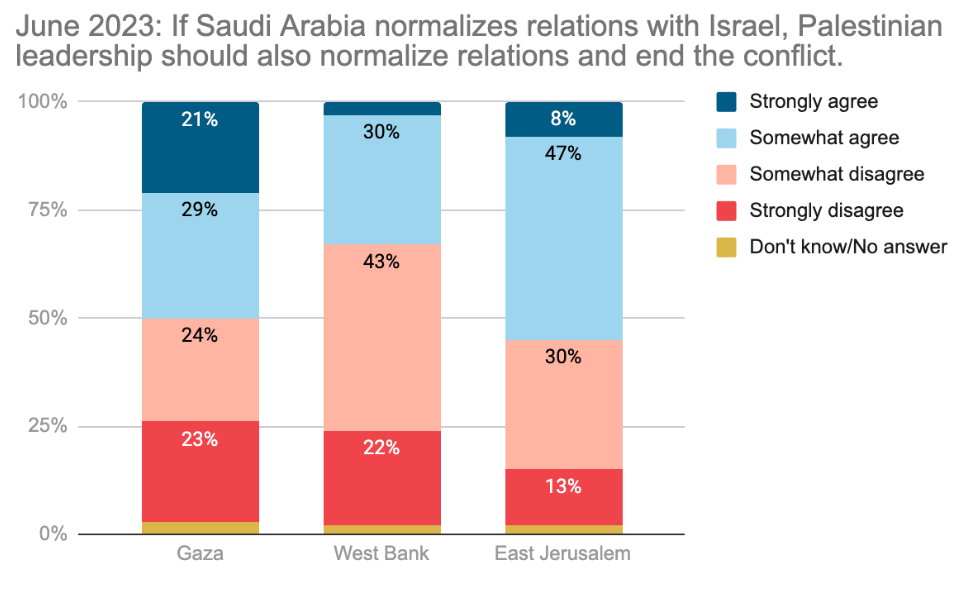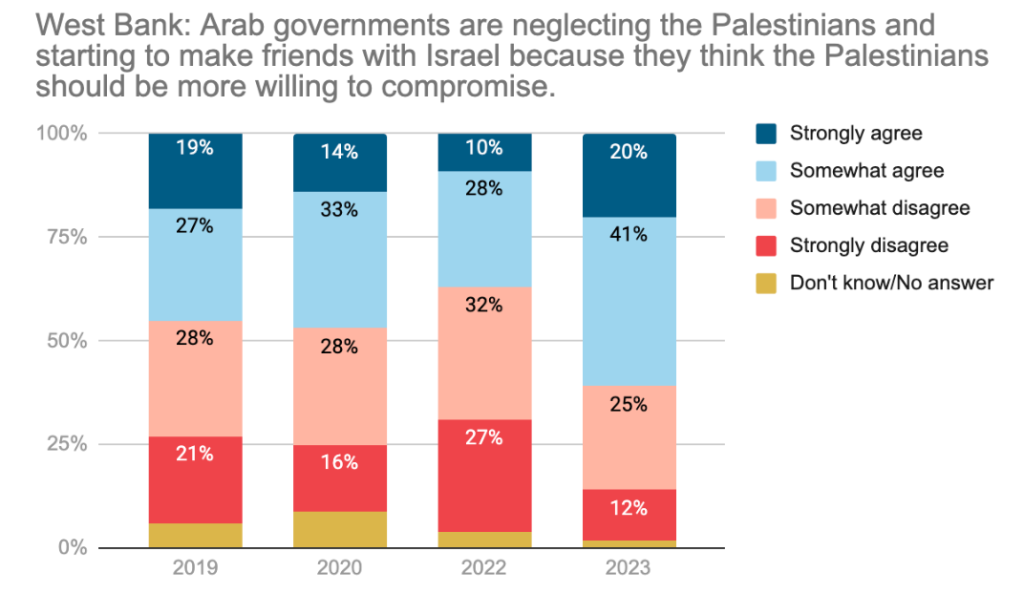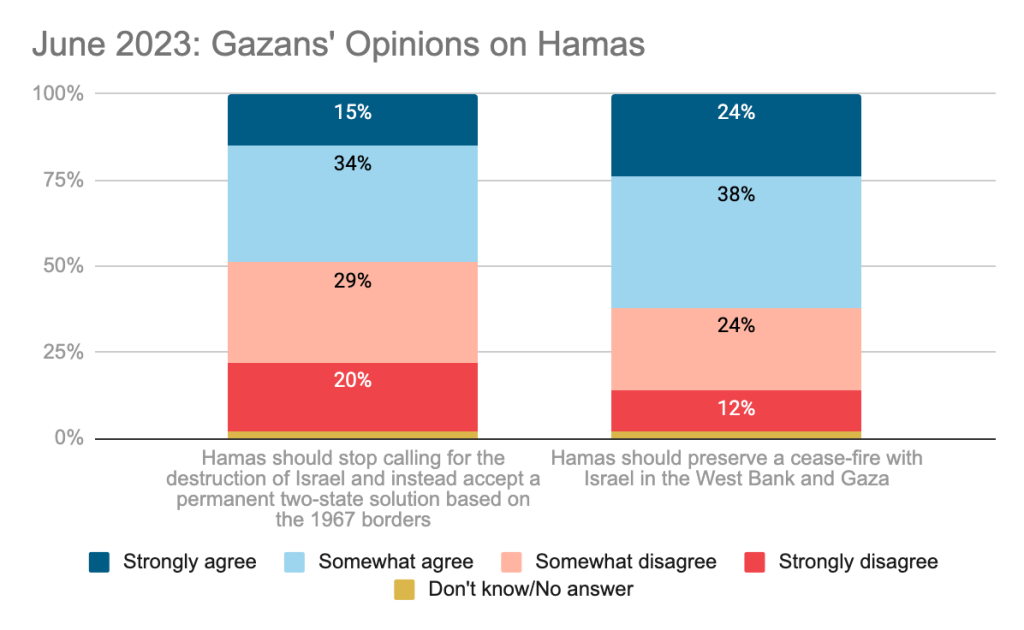Australia/Israel Review
The surprising Palestinian split on Saudi normalisation
Aug 30, 2023 | Catherine Cleveland, David Pollock
After years of stagnation and conflict, a new Israeli-Palestinian deal is once again on the international agenda – only this time, remarkably, in return for steps toward “normalisation” of Israeli relations with Saudi Arabia. The possibility of such an agreement has been rumoured for years and is now an explicit goal of Israeli Prime Minister Binyamin Netanyahu. Informal ties are already warming, including the opening of Saudi airspace to Israeli flights and early public joint ventures between Saudi and Israeli companies.
But further progress, according to Saudi officials, will depend on some Israeli concessions to the Palestinians. The kingdom has publicly emphasised this factor by appointing the country’s first-ever non-resident Ambassador to the State of Palestine in mid-August. And one key component to this conversation has been missing: How do Palestinians – the people themselves, not their leaders – see the potential of Saudi normalisation?
In July, the Washington Institute conducted a poll with the Palestine Centre for Public Opinion – based in Beit Sahour just outside Bethlehem – involving over 1,500 face-to-face interviews in the West Bank, Gaza, and east Jerusalem. The results provide a unique snapshot of Palestinian public opinion on this and other key issues. Specifically, respondents were asked whether they agreed with this statement: “If Saudi Arabia normalises relations with Israel, the Palestinian leadership should also normalise relations and end the conflict.”
Contrary to common misconception, there is no single attitude on this and other issues relating to normalisation across Palestinian society. And on this question – as with many others – attitudes sharply diverge between the West Bank and Gaza. Two-thirds of West Bank residents reject this proposal to normalise ties in the face of a Saudi-Israeli deal. But turn instead to Gaza, and attitudes are split: 50% of Gazans would support normalising relations with Israel were Riyadh to do so. Strikingly, 21% of Gazans agree strongly with this idea – statistically equivalent to the 23% of Gazans who strongly disagree.
This split is also evident in attitudes about the impact of the Abraham Accords on the region – 47% of Gazans say they have had at least a somewhat positive impact, versus 29% of West Bankers. Similarly surprising is that nearly half (42%) of Gazans agree with this statement: “I hope someday we can be friends with Israelis, since we are all human beings after all.” In the West Bank, the corresponding figure drops to just 30%. Even more striking is that in east Jerusalem, whose nearly 400,000 legal Palestinian permanent residents have daily contact with Israelis, the clear majority (63%) agree at least “somewhat” with that purposely provocative proposition about friendship with Israelis someday.
More broadly, however, the majority of Gazans and West Bankers alike (58% and 61%) agree with this statement: “Arab governments are neglecting the Palestinians and starting to make friends with Israel because they think the Palestinians should be more willing to compromise.”


 In the case of Gaza, a similar percentage has expressed this attitude for years – including when first asked in 2019. Among West Bankers, by contrast, the prevalence of this attitude is much newer. When presented with the same question in June of last year, just 38% of West Bank residents had agreed with this statement, but 61% do so now.
In the case of Gaza, a similar percentage has expressed this attitude for years – including when first asked in 2019. Among West Bankers, by contrast, the prevalence of this attitude is much newer. When presented with the same question in June of last year, just 38% of West Bank residents had agreed with this statement, but 61% do so now.
Today, moreover, fully three-quarters of Gazans support Arab governments taking “a more active role in Palestinian-Israeli peacemaking, offering incentives to both sides to take more moderate positions” – with almost half (48%) saying they “strongly” agree. And when it comes to Jerusalem in particular, a remarkable three-quarters of Palestinians in each of the three territories polled also say that Saudi Arabia should have some role in the holy city’s future: Gazans, 73%; West Bankers, 71%; east Jerusalem Palestinians, 77%.
These numbers also reflect a desire among many Palestinians for change to the status quo, including – again contrary to conventional wisdom – by peaceful means if possible. Half of Gazans agree that Hamas should “stop calling for the destruction of Israel and instead accept a permanent two-state solution based on the 1967 borders.” And at least half in Gaza and the West Bank alike support the Palestinian resumption of negotiations with Israel, 58% in the former and 50% in the latter.
As private Israeli-Saudi negotiations continue, Saudi engagement and the resulting concessions on the Palestinian issue it may obtain from Israel are likely to find a favourable reception among many in Gaza. In the West Bank, more residents may be cautious about whether such an agreement is in their interests. But the majority of Palestinians are clearly searching for change, one way or another. If steps toward Saudi-Israeli normalisation can provide meaningful improvements in Palestinian life – even without full Palestinian statehood – many Palestinians are not likely to see them as the “stab in the back” that some of their leaders have proclaimed. And for the United States, these striking new survey findings demonstrate that if Palestinians continue to view Saudi Arabia as working for their interests, they are likely to see the current US push for this historic agreement as beneficial.
Catherine Cleveland is the Washington Institute for Near East Policy’s Croft-Wagner Family Fellow and editor of the “Fikra Forum”. David Pollock is the Bernstein Fellow at the Washington Institute, focusing on regional political dynamics and related issues. © Washington Institute (washingtoninstitute.org), reprinted by permission, all rights reserved.
Tags: Israel, Palestinians, Saudi Arabia






